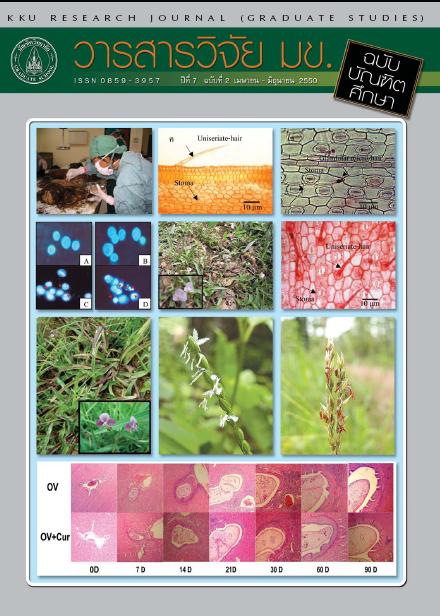The Construction of Probability Lessons for Mathayom Suksa III Students by Using Simulation to Enhance Mathematics Problem Solving Abilities
Keywords:
Probability lesson(เรื่องความน่าจะเป็น), Simulation(สถานการณ์จำลอง), Mathematics problem solving(การแก้ปัญหาทางคณิตศาสตร์)Abstract
การวิจัยครั้งนี้มีวัตถุประสงค์เพื่อสร้างและหาประสิทธิภาพของบทเรียนเรื่องความน่าจะเป็นและเปรียบเทียบผลสัมฤทธิ์ทางการเรียนวิชาคณิตศาสตร์โดยการเรียนการสอนแบบปกติกับการใช้สถานการณ์จำลองที่ส่งเสริมความสามารถในการแก้ปัญหาทางคณิตศาสตร์ โดยใช้วิธีจำแนกกลุ่มนักเรียนออกเป็นกลุ่มเก่ง กลุ่มปานกลาง และกลุ่มอ่อน โดยฝึกการแก้ปัญหาผ่านสถานการณ์จำลองที่กำหนดให้ สำหรับเครื่องมือวัดที่ใช้ในการเก็บรวบรวมข้อมูลประกอบด้วย แบบทดสอบวัดผลสัมฤทธิ์ทางการเรียน แบบประเมินพฤติกรรม และแบบสอบถามวัดแรงจูงใจใฝ่สัมฤทธิ์ จากการวิจัยพบว่า ประสิทธิภาพและประสิทธิผลจากบทเรียนที่ใช้สถานการณ์จำลองที่ส่งเสริมความสามารถในการแก้ปัญหาทางคณิตศาสตร์มีค่าสูงกว่าบทเรียนแบบปกติ และ การเรียนการสอนโดยใช้สถานการณ์จำลองที่ส่งเสริมความสามารถในการแก้ปัญหาทางคณิตศาสตร์ทำให้ผลสัมฤทธิ์ทางการเรียน การประเมินพฤติกรรม และแรงจูงใจใฝ่สัมฤทธิ์ของผู้เรียนในกลุ่มเก่ง กลุ่มปานกลาง และกลุ่มอ่อนสูงกว่าการเรียนการสอนแบบปกติ
The purpose of this research is to establish and determine efficiency of learning probability lessons and to compare the learning effectiveness of mathematics teaching between conventional method and simulation to enhance mathematics problem solving abilities. Students were separated by ability into three groups including excellent, medium and low levels by using simulation to enhance mathematics problem solving. The data collecting tools were learning effectiveness evaluation from achievement tests, behavior assessment from motivation to success in learning mathematics evaluation. The research results indicated that the efficiency and learning effectiveness in using simulation to enhance mathematics problem solving abilities was higher than those of conventional methods. We found that the simulation to enhance mathematics problem solving abilities yielded a good learning effectiveness, behavior assessment of those who were excellent, medium and low levels, were higher than those with the conventional method.


